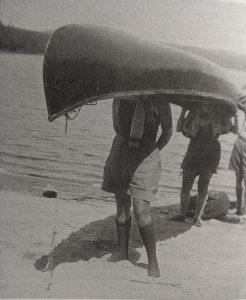In the early years of the Ontario camping movement, camp was reserved for boys and men; however, starting in the interwar period, the first girls’ camps were founded. Much like boys’ camps, the earliest private girls’ camps were generally associated with private girls’ schools and were often founded by educated, single, white women of the middle to upper classes. Instead of the rugged masculinity of private boys’ camps, early girls’ camps often reinforced contemporary notions of femininity and gender difference. Viewing girls’ primary societal function as mothers-to-be, early twentieth-century society discouraged strenuous physical activity for young women, resulting in many early girls’ camps emphasizing domestic and artistic activities, such as weaving, crafts, and theater.1
Private Girls’ Camps and Canoe Tripping

Much like their male counterparts, upper-class girls privileged enough to attend private girls’ camps often engaged in canoe tripping; however, such trips were often shorter than boys’ trips and almost exclusively lead by male guides, a trend that would continue for some camps until the 1980s. Girl campers were often discouraged from performing the most physically demanded aspects of tripping, such as paddling and portages, and instead performed the more domestic tasks of cooking, cleaning, and making camp. In many cases, girls were discouraged from overnight trips altogether. Yet, private girls’ canoe tripping camps did exist, although few in number and they often afforded girls and young women a degree of freedom from the constricting gender stereotyping of the period.2